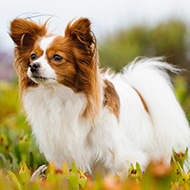
Scheme designed to combat Von Willebrand disease type 1.
A new DNA testing scheme for Von Willebrand disease type 1 in the papillon has been announced by the Kennel Club.
The move follows consultation with the breed health coordinator, and is designed to combat inherited disease in the breed. Tested dogs will be recorded on the Kennel Club systems as either 'clear', 'carrier' or 'affected'.
The Kennel Club writes: 'Test results will be added to the dog’s registration details which will trigger the publication of the result in the next available Breed Records Supplement. The result will appear on any new registration certificate issued for the dog and on the registration certificates of any future progeny of the dog, and also on the Health Test Results Finder on the Kennel Club website.'
Von Willebrand disease is an inherited bleeding disorder, characterised by bruising, bleeding from the nose or gums and prolonged clotting time. There are several variants associated with Von Willlebrand, but vWD1 is the most common and has been observed in the papillon.
A dog can inherit the disease if both its mother and father have the abnormal gene. A dog that only inherits one gene (either from its mother or father) is unlikely to show signs of the disease, but will be a carrier and could pass the condition on to any offspring.
The Kennel Club adds: 'Results for dogs already tested can also be recorded, but owners will need to submit copies of the DNA certificates themselves. If the owner includes the original registration certificate for the dog (not a copy) then a new registration certificate will be issued, with the DNA result on it, free of charge.
'DNA test certificates should be emailed to health.results@thekennelclub.org.uk.'



 The RCVS has announced a new version of its 1CPD mobile app, with enhanced features for veterinary surgeons and veterinary nurses to record their continuing professional development.
The RCVS has announced a new version of its 1CPD mobile app, with enhanced features for veterinary surgeons and veterinary nurses to record their continuing professional development.